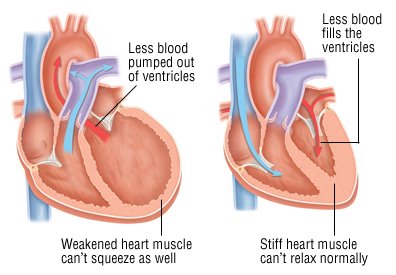Heart Failure
What Is It?
Heart failure is a condition in which the heart cannot pump efficiently enough to meet the body's need for blood. Contrary to its name, heart failure does not mean the heart has failed completely. Heart
failure is also called congestive heart failure.
failure is also called congestive heart failure.
The inefficient pumping associated with heart failure causes a backup of blood in the veins leading to the heart. It causes the kidneys to retain fluid. As a result, the body's tissues swell.
The swelling most commonly affects the legs. But it also can occur in other tissues and organs. When it occurs in the lungs, it causes breathing difficulty.
Heart failure often is the end stage of another form of heart disease. Its many causes include:
- Coronary artery disease
- High blood pressure (hypertension)
- Heart valve disorders (including rheumatic heart disease)
- Congenital heart disorders
- Cardiomyopathy (disease of the heart muscle)
- Heart attack
- Cardiac arrhythmias (problems with the heart rate and/or rhythm)
- Exposure to toxins, including excessive alcohol
Hyperthyroidism, diabetes and prolonged lung disease also increase the risk of heart failure.
In some people with heart failure, the heart muscle becomes weaker. It cannot pump as well. In other people, the heart muscle becomes stiff. As a result, the heart cannot fill with enough blood between heartbeats.
 |
Symptoms
The first symptom of heart failure often is fatigue. As the condition worsens, shortness of breath and wheezing occur during exertion. Eventually, shortness of breath and wheezing occur when you are resting.
As fluid accumulates in the lungs, people with heart failure may begin to sleep propped up with pillows. This makes breathing easier. There also can be a chronic cough due to fluid accumulation in the lungs.
Fluid also can collect in the legs and ankles, causing swelling. In people who are less active, collected fluid can accumulate in the middle of the body. Some people urinate several times during the night as the kidneys drain off some of this excess fluid. As the body accumulates more and more fluid, the person may experience significant weight gain.
 |
Heart failure usually affects both sides of the heart. But in some people it affects only one side. When heart failure affects mainly the left side of the heart, the symptoms are more likely to involve breathing difficulties. When mainly the right side is affected, the main symptoms may be leg swelling and abdominal swelling.
Diagnosis
Your doctor will review your medical history and ask for details about your symptoms. For example, he or she may ask:
- How many blocks you can walk without becoming short of breath
- The number of pillows you sleep on
- Whether you suddenly wake up after falling asleep because of severe shortness of breath
During your physical examination, your doctor will:
- Check your vital signs (such as blood pressure and temperature)
- Check your heart rate and rhythm
- Listen for abnormal heart sounds
- Listen to your lungs for abnormal breathing sounds that indicate fluid buildup.
- Press on the skin of your legs and ankles to check for swelling
- Feel your abdomen to check the size of your liver. Fluid backup from the heart can cause liver swelling.
You also will have diagnostic tests. An electrocardiogram and chest X-ray will check for enlargement of the heart and fluid in the lungs.
Other diagnostic tests may be needed to find the cause of your heart failure. For example, an echocardiogram may be done to look for heart valve abnormalities, signs of heart attack, or other cardiac abnormalities.
The echocardiogram is particularly important. It can determine whether the heart muscles have weakened or become stiff. Treatment can differ depending on the type of heart failure.












0 comments:
Post a Comment